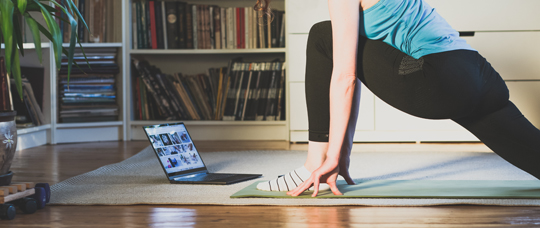Active study breaks
Freiburg, Nov 23, 2020
Your neck hurts, your back is slouching and your attention is waning. Anyone who spends a long time sitting at a desk in the library or at home often suffers from physical complaints and concentration problems. The Student Health Management (SGM) at the University of Freiburg has uploaded several videos to its media portal. Sports science students demonstrate simple exercises that help to activate and strengthen the body during study breaks. In an interview with Patrick Siegert, Katharina Poggel from SGM explains how the program aims to promote student health.
 In the active break, students can interrupt their sitting time and restore their concentration. Photo: Melinda Nagy/Adobe Stock
In the active break, students can interrupt their sitting time and restore their concentration. Photo: Melinda Nagy/Adobe Stock
Ms. Poggel, how will the videos help students?
Katharina Poggel: When working long hours in a sitting position, posture suffers most, back and neck tense up and hip flexor muscles shorten. Together with sports science students, we have produced six videos so far, which can now be viewed on the media portal. Further videos are already being planned. With the help of the presented exercises, muscle groups can be activated, strengthened or stretched in a targeted manner, thus mobilizing the entire body. For example, by stretching their chest muscles and the shoulder-neck area, students can achieve an upright posture again.
What is your goal with the “Active Break” project?
Teachers can play the short videos during their lectures and thus create opportunities for active breaks. The exercises are designed for use in lecture halls, seminar rooms and at home. In this way, students can consciously interrupt their sitting time, especially during the corona pandemic, and restore their concentration. Studies have shown that long periods of sitting increase the risk of cardiovascular diseases such as heart attack or stroke, and regular active breaks have a positive effect on insulin levels, among other things.
 Students are increasingly suffering from health issues and a high level of stress, says Katharina Poggel. Photo: Jürgen Gocke
Students are increasingly suffering from health issues and a high level of stress, says Katharina Poggel. Photo: Jürgen Gocke
The SGM has developed a University-wide strategy to prevent and counteract health problems. What do you have in mind?
We have noticed an increase in health issues and a high level of stress among students. This is also shown by the results of our studies conducted at the University of Freiburg in the areas of nutrition, exercise, relaxation and stress reduction, self-management and psychosocial health. Especially on the subject of nutrition, there have been hardly any opportunities for students to obtain information up to now. Since 2020, we have therefore been organizing regular nutrition workshops in which we provide nutrition tips and focus on cooking healthy food together. These events are currently held online. But we also want to create a holistic, healthy environment for students by providing standing desks in lectures, retreats for relaxation, and counseling on self-management and psychosocial problems in cooperation with the University and other institutions.
What every day tips can you recommend to students?
Do the monitor, desk and chair have the right height? You will find valuable tips on this and other questions on our homepage. To work standing up, for example, you can place a small side table on the desk. If possible, you should regularly change your body position at work so that different muscle groups are activated. If sitting cannot be avoided, you can do your body some good by taking short active breaks every 20 to 30 minutes. Unfortunately, the long-term health consequences of uninterrupted desk work cannot be compensated for by occasional sports activities in the evening.

